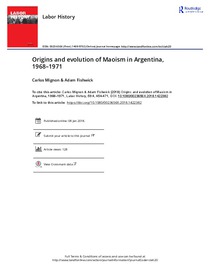Origins and evolution of Maoism in Argentina, 1968–1971

Mignon, Carlos ; Fishwick, Adam
2018
59
4
August
454-471
communism ; political ideology ; automobile industry ; trade union ; history
Economics
https://doi.org/10.1080/0023656X.2018.1422382
English
Bibliogr.
"An apparently strange phenomenon in the history of ideas, Maoism was the only new ideological current to emerge in the western Hemisphere after the Second World War. With constant references to popular China, but situated in a local context, Maoism developed as a unique ideology with a particular physiognomy that was forged in the sphere of the political left. In Argentina, the principle organisations that represented it – the Communist Vanguard and the Revolutionary Communist Party – were deeply involved in the class struggles of the industrial proletariat of Córdoba. Following an explication of our understanding of the role of political ideas in labour struggles through the work of the Chilean historical sociologist Tomás Moulian, we describe two foundational phases for these parties: the organisational and ideological. We situate these in the broader context of both the historical development of the working class in Córdoba and the explosive moments of Cordobazo. From here, we assess the tensions and contradictions in these phases and discuss the impact on their efforts to become the ‘vanguard' party of the working class, thereby showing the importance of tracing the origins and evolution of Maoism for understanding the radical labour history of Córdoba."
Digital
The ETUI is co-funded by the European Union. Views and opinions expressed are however those of the author(s) only and do not necessarily reflect those of the European Union or the ETUI.